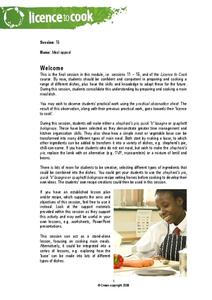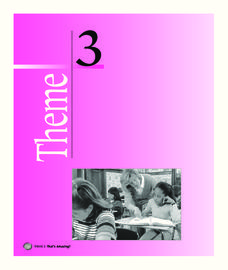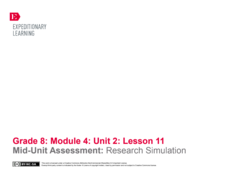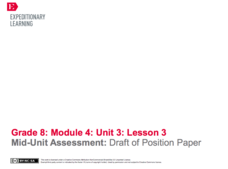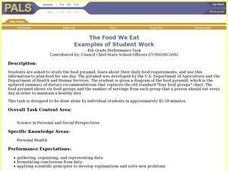Curated OER
Macromolecule Lab
During a macromolecule lab, young chemists perform multiple tests, including iodine starch tests, to determine if eight mystery foods contain lipids, sugars, or starches.
Curated OER
Pizza Farm Activities
Students identify the food groups and agricultural sources of pizza ingredients. They construct a construction paper pizza, identify the crops grown for pizza ingredients, and make and eat English muffin pizzas.
Curated OER
Taco Grande
What do you use to chop an onion or brown the meat? Learners with special needs read through a taco recipe, then use it to complete three different academic development activities. They circle the best utensil for the job, match each...
Curated OER
Healthy Eating
A short, yet very informative, presentation on the basics of healthy eating. Young dieticians view slides which have colorful photos and graphics of foods that are healthy (and not so healthy), along with information on the basic food...
Nemours KidsHealth
School Lunch: Grades 9-12
Go! Slow! Whoa! As part of a study of the nutritional value of foods available on the school campus, groups label those that are fine anytime as "Go" foods. Those that are okay a few times a week get the "Slow" label while those...
Roald Dahl
Matilda - The Platinum-Blond Man
Before reading Chapter Six, "The Platinum-Blond Man" in Matilda, readers preview the illustration of Mrs. Wormwood dropping her plate of food, and think about what may have happened to cause the scene. After reading the chapter, class...
Food a Fact of Life
Meal Appeal
To demonstrate their mastery of time management and kitchen organization skills, groups prepare either a shepherd's pie, lasagne, or spaghetti bolognese.
Houghton Mifflin Harcourt
That’s Amazing!: English Language Development Lessons (Theme 3)
That's Amazing! is the theme of an English language development unit created by Houghton Mifflin. Following a speak, look, move, and listen routine, scholars delve into topics; seasons, weather, animals, landforms, telling time,...
EngageNY
Mid-Unit Assessment: Research Simulation
As part of a mid-unit assessment, scholars complete a research simulation about food deserts to mimic the research process. Afterward, they engage in a think-pair-share to discuss what they've learned throughout the unit.
EngageNY
End of Unit Assessment: Presentation of Position
What is the difference between formal and informal language? Pupils rewrite their position speeches to adapt them for an audience of adults. Next, they present their speeches in small groups, attempting to answer the question, "Which...
Nemours KidsHealth
Healthy Snacking: Grades K-2
Two lessons, all about snacking, look closely at how to make smart, balanced choices. Lesson one challenges pupils to create a menu for the hypothetical restaurant, The Snack Shack. Lesson two offers a variety of informative articles...
Howard Hughes Medical Institute
Lesson 5: Tracking Lion Communities
Researchers in Gorongosa National Park placed cameras there many years ago to understand what was happening with the lion communities that lived there. Little did they know, they opened a door to so much more! Inquisitive...
EngageNY
Creating a Visual Component for the Speech: End of Unit Assessment Preparation and Practice
Eye contact, volume, pronunciation. Working with partners, scholars practice presenting their speeches about the best food chain. Additionally, they choose a visual component to support their end-of-unit speech.
EngageNY
Mid-Unit Assessment: Draft of Position Paper
What is the purpose of an introduction and conclusion? Using the resource, scholars review the model position paper from activity one and discuss the author's choices. Next, they draft their position papers' introductory and concluding...
Teach Engineering
Investigating the Properties of Plastic and its Effects on the Environment
Pore over the properties of plastic. Working through four different stations, pupils investigate some properties of plastic, including chemical decomposition, mechanical breakdown, density, and the ability to infiltrate the food chain....
Nemours KidsHealth
School Lunch: Grades 6-8
School lunches are the focus of two learning activities. Activity one challenges small groups to create a lunch menu for an imaginary cafe. Activity two sheds light on one's afternoon eating habits. Asking scholars to record what they...
National Wildlife Federation
Soil Decomposers
Worms are the kings of the decomposers. A four-part lesson has learners experiment with the characteristics of earthworms and their sensitivities. They vary factors such as light, acidity, temperature, and touch of soil and observe the...
DocsTeach
The School Lunch Program and the Federal Government
The school lunch program is rooted in the struggles of the Great Depression and is still assisting families today. Academics research documents and images relating to the creation of the school lunch program. Scholars use a worksheet to...
Curated OER
Food Sources
Students develop a working vocabulary of food by categorizing foods by their sources or origins. Working in groups, they determine at least four ways in which food is grown or produced. Groups create a poster by diving selected food...
Curated OER
My New Food
Students create new fruits and vegetables and describe their health benefits. In this nutrition lesson, students work as a class to produce a new fruit or vegetable, make it using modeling clay, and describe the features. Students then...
Curated OER
The Food We Eat
Students plan a menu for one day after they study the food pyramid and learn about their daily food requirements. They are given an updated food pyramid with a summary fo dietary recommendations that replaces the old standard "four food...
Curated OER
Food Pyramid Picnic
Second graders discuss the food pyramid and appropriate choices for each food group. They plan a nutritional meal for a picnic lunch and make a class book. As a culminating event, the class plans and enjoys a picnic.
Curated OER
Food Pyramid
Second graders are introduced to the food groups on the food pyramid. Individually, they draw pictures of their favorite foods and identify which food group it belongs. To end the lesson, they discuss the importance of eating a variety...
Curated OER
Nutrition
First graders identify the Five Food Groups and the proper servings of each. They study the physical features of different foods such as fruits, and vegetables.
Other popular searches
- Five Basic Food Groups
- Esl Lessons Food Groups
- Four Basic Food Groups
- Clip Art Food Groups
- Basic Food Groups
- Four Food Groups
- 5 Food Groups
- Food Groups Science
- The Food Groups
- Food Groups Nutrition
- Nutrition and Food Groups
- 5 Food Groups Games








